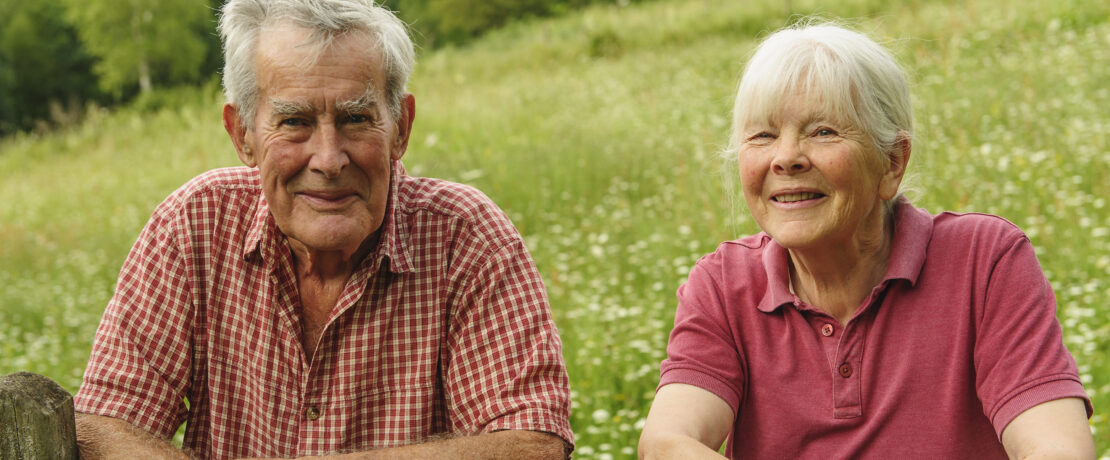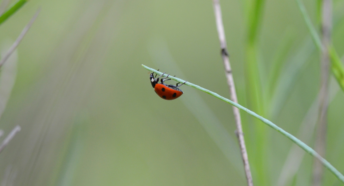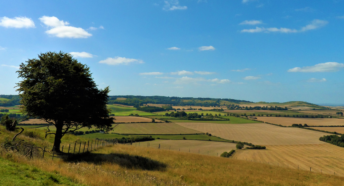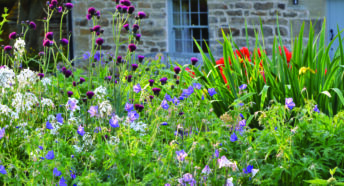Wildflowers and wildlife at Deer Park Farm
Tucked into the folds of Devon’s Teign Valley, Deer Park Farm is run as a haven for wildlife by John Whetman and Audrey Compton. Writer and photographer Robert Hesketh caught up with them for a chat….
The farm, which is 47 hectares in size, won Plantlife’s Meadow Makers Award England in 2015, plus an award from Devon Local Nature Partnership for its Wildlife Wardens Scheme. It also won the Make a Difference Environment Award from Radio Devon.
One in a thousand
‘We really believe in what we do and want our visitors to love and protect wildlife too…. but you couldn’t live here and not want that,’ says Audrey. ‘Deer Park Farm is exceptional, one in a thousand, because it has never been intensively farmed. That’s because it’s so steep and no one has put fertiliser or pesticides on it. There is a rich succession of wildflowers and butterflies through the spring and summer.’
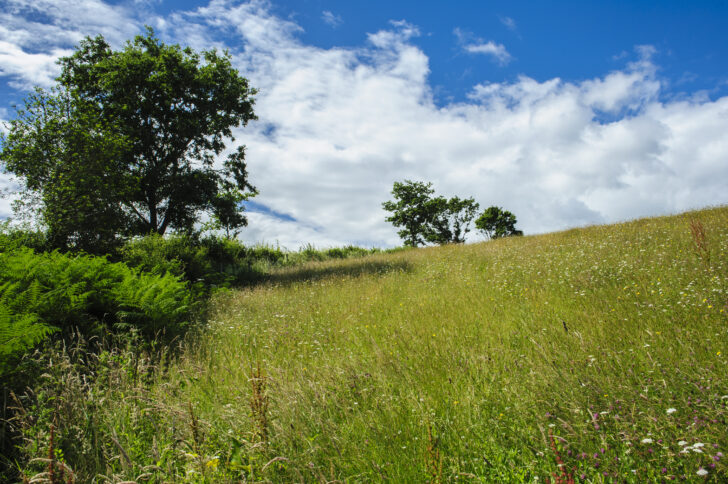
Nurturing the farm’s wildlife demands knowledge as well as hard work. Fortunately, the couple brought a wealth of valuable experience to the task: ‘Before we came here in 2000, Audrey had been a dairy farmer. She took a degree in environmental studies and then spent many years as a ranger with Teignbridge District Council,’ explains John. ‘I had been a nurseryman and was well used to a variety of farming jobs such as fencing and hedging, so between us, we had the skills to manage Deer Park Farm and we were young enough to have the energy to do it too. It’s the best thing we’ve ever done!’
Wildlife wardens
John and Audrey keep their farm’s grassland unimproved – or ‘undamaged’ from the wildlife viewpoint. It’s only lightly stocked with sheep and cattle, and largely because of this, Deer Park’s fields have a good soil structure which is constantly enriched with organic matter. John explained that soil with a good structure is rich in invertebrates, a key part of the food chain which supports everything above it, including birds and mammals. In contrast, intensive arable farming degrades and sterilises the soil with fungicides, herbicides and insecticides. With depleted levels of organic matter, it is only kept going by large doses of artificial fertiliser.
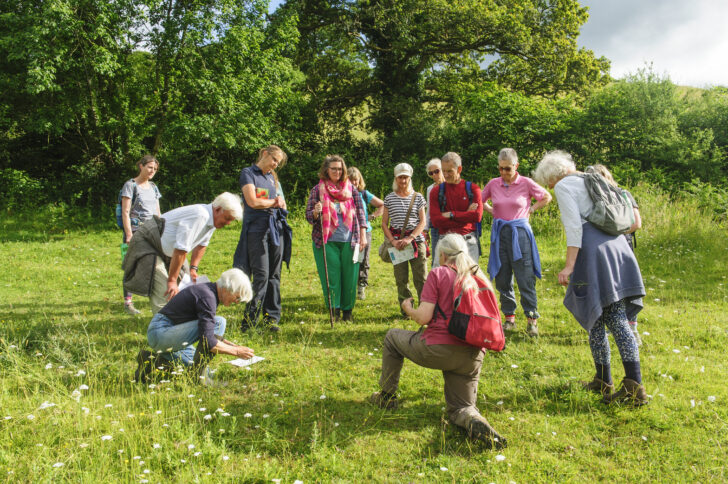
Deer Park’s diversity of wildflowers and insects is remarkable, as I discovered on a plant identification exercise for wildlife wardens and Life in the Meadows, both led by Audrey. The latter group included adults of all ages with varying levels of wildlife knowledge. Encouragingly, several parents had brought their children. Everyone became immersed in discovery, with collecting jars, nets, magnifying glasses and cameras.
‘We work with a network of environmental organisations and love to share the farm with visitors,’ says Audrey. ‘Some 30 groups come every year, including college students, U3A and Devon Wildlife Trust. Since Covid, most visits have been training sessions for our Wildlife Warden Scheme. As part of Action on Climate in Teignbridge, we’ve trained 120 volunteer wardens in a variety of skills, including meadow flower and ancient woodland identification; gathering and sowing wildflower seeds; setting up a tree nursery; plus planting and establishing new hedges. Our wardens are of all ages and all abilities, and our aim in this scheme is for everyone to have fun!’
Remarkable biodiversity
The wardens’ tick lists filled up rapidly, including plants with medicinal properties like selfheal and other plants with fantastic names such as corky-fruited water-dropwort, a species rarely found outside the Teign Valley. Most of them are natives to the area, though a few were introduced accidentally or deliberately by humans. All told, Audrey and John have recorded 370 plant species.
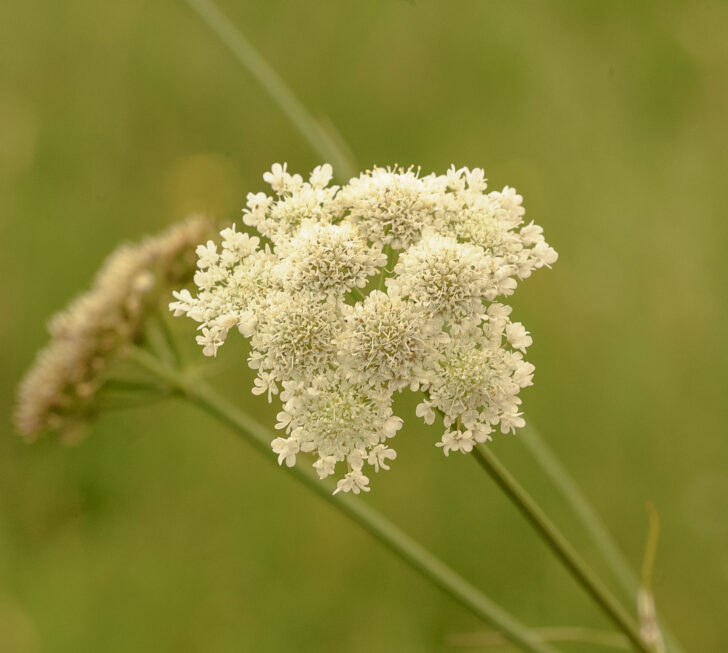
This diversity of plants is matched by the diversity of insects, animals and birds. Foxes, badgers, stoats, fallow deer and rabbits thrive on the farm and otters visit the Bramble Brook. All the common woodland and field species have been listed. Buzzards, sparrow hawks, kestrels, goshawks and peregrines are all nesting near Deer Park.
Enormous wildlife value
The farm’s dense patchwork of hedge banks is integral to its biodiversity. Oak, ash and alder are the main tree species, but there are many smaller species too, such as hazel, holly and field maple. Dog rose and field rose, spindle, ivy, honeysuckle and old man’s beard are common too.
‘Hedge laying is very satisfying as a craft,’ says John, who lays the hedges at Deer Park on a rotation of around 16 years. ‘As an added bonus, we get all our firewood from it. According to Hooper’s Law, the diversity of species in our hedges indicates many of them are medieval.
‘Devon has more species-rich hedges than any other county. They’ve got enormous landscape and wildlife value and are part and parcel of our history. You can’t imagine Devon’s farmland without hedges; it would be barren and featureless. Fortunately, there’s never been much incentive to remove hedges on a grassland farm like this, where we have no monstrous combine harvesters to manoeuvre. Hedges provide shelter from rain, sun and wind. They also prevent flooding, especially hedges going along contours, by preventing runoff and holding the soil together. Plus, of course, they are an amazing ‘carbon bank’, reducing the effects of climate change.’
‘Look after our world better’
What of the future? Audrey didn’t mince her words when she addressed the Life in the Meadows group: ‘I beg you to look after our world better. Unless we can do something about climate change, pollution and soil depletion then we haven’t got a hope for humankind or wildlife. It’s up to us to change the way we live, to use less fuel, to buy fewer shiny new cars and clothes and all the other things we do without thinking. Do give us a call and join us on one of our nature walks, help us to keep the farm going for the sake of the children and the world they will inherit.’
About the author
Robert Hesketh is a freelance writer and photographer based in Devon.
You can get in touch with Deer Park Farm by sending them an email.
